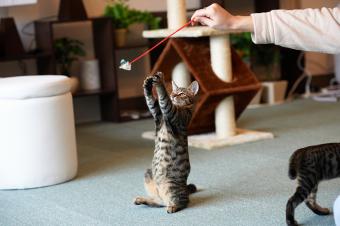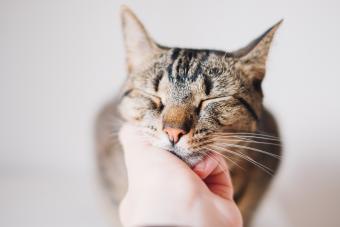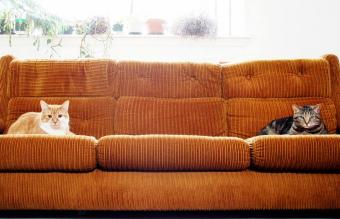
Cat paw sucking may seem weird, and if your cat does it, you may wonder why. Don’t worry too much if you notice your kitty has their paw in their mouth. This behavior is completely normal, and there is an explanation.
Paw Sucking in Cats
If you look over at your cat and they’re sucking their paw, of course you’re going to be a bit puzzled. If you’re not sure what’s up or why it’s happening, there could be several reasons they’re doing it.
Nursing
Kittens will suck on their own paws to simulate nursing behavior. They may also suck on things like blankets, towels, or other household items. Although it can happen with any cat, you'll see it most frequently in kittens who were taken too early from their mother. Most kittens outgrow the behavior as they get older.
It's similar to how human babies suck on their pacifier, but outgrow it as toddlers.
Contentment
Cats may suck their paws when they're cuddling up to you. When they're comfortably nestled in your arms, sucking their paw and purring, they're feeling very secure and content. Take this as a sign of your cat's great affection for you and count yourself lucky you have such an interesting pet.
Anxiety
Just as a happy cat will suck on their paws to show that they're content, a stressed cat may suck their paw to soothe their anxiety. If you see a cat sucking their paw in conjunction with other stress behaviors, like hiding, crying, or fearful body language, discuss the issue with your vet. Your cat may need some help to get back to normal.
Compulsion
Some cats may begin sucking their paws for benign reasons, and the behavior eventually becomes obsessive to the point of harming their paws. Or they may have begun sucking their paw because of an injury or irritation, and the behavior is now constant. Discuss this behavior with your vet. They will probably want to perform tests to see if there is an underlying medical condition and prescribe medication for the behavior. Some conditions that are associated with paw sucking are:
- Allergies
- Problems of the endocrine system like hyperthyroidism and hypothyroidism
- Dental disease
Breed-Specific
This behavior can sometimes be breed-specific. This means there are some breeds more prone to paw sucking than others. It's most commonly seen in Asian breeds, including:
- Balinese
- Siamese
- Tonkinese
Skin Irritation
A cat may suck at their paw if the pad has become irritated by a foreign object or they stepped in something toxic. If you notice that their paw pad looks red and sore, bring your cat into the vet to have their paw checked for wounds and skin irritations.
Look around the house to see if they could have stepped in something they shouldn't. If your vet knows what it is, they may be able to offer a better solution.
Dealing With Paw Sucking in Cats
In most cases, paw sucking in cats isn't an alarming issue that requires immediate attention. As long as it doesn't become excessive or irritate your cat's paws, your veterinarian probably won't do anything for it. They'll chalk it up to comfort and recommend you watch to make sure it stays that way. If there are underlying problems, you can help your kitty with some simple solutions.
Cat Enrichment

If your cat is sucking their paws out of anxiety or compulsion, providing them with lots of mental enrichment and exercise can help alleviate stress. Provide your kitty with toys that encourage play and thinking skills. You want to get them tired out both physically and mentally. The saying usually goes, "a tired dog is a happy dog," but the same applies to your cats.
Medication
If the paw sucking continues excessively, your veterinarian may prescribe anxiety medication to help reduce your cat's stress. This, coupled with enrichment, can help make a cat feel more relaxed and less likely to suck and chew on their paws.
Give More Attention
Sometimes, cats just want more attention, and they know exactly how to get it if you've shown concern with their paw sucking behavior. It can be a great way to grab your attention. Setting aside more time for them throughout the day, every day, may help.
Diagnosis Is Critical
If your cat is sucking their paws and you notice other signs of an underlying problem, including hair loss, weight loss, diarrhea, vomiting, or a coat in poor condition, bring your cat into the vet for testing to rule out a serious medical condition.
If your vet doesn't find any medical reasons for the obsessive behavior, they may refer you to a feline behaviorist.
Cats and Paw Sucking
While it may seem unusual, for the most part, paw sucking is a natural behavior you shouldn't be concerned about. Watch for signs of underlying illness and speak to your veterinarian right away if you suspect that their paw sucking is based on anxiety or medical problems.







